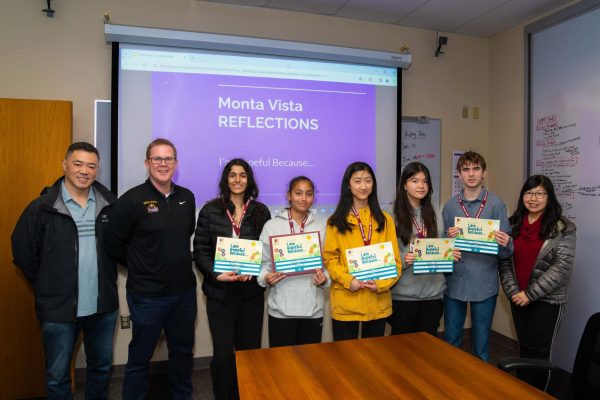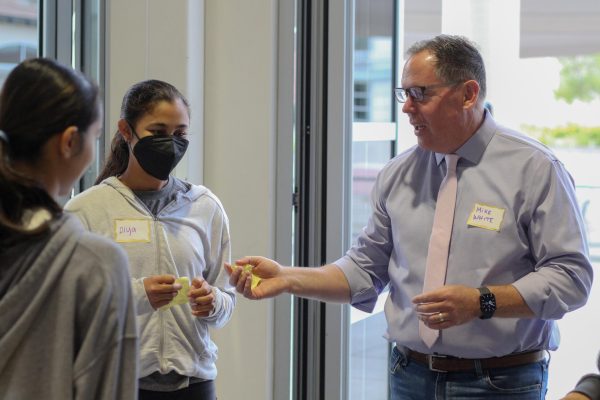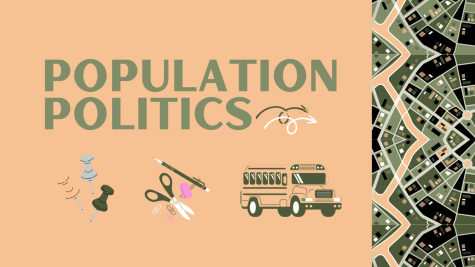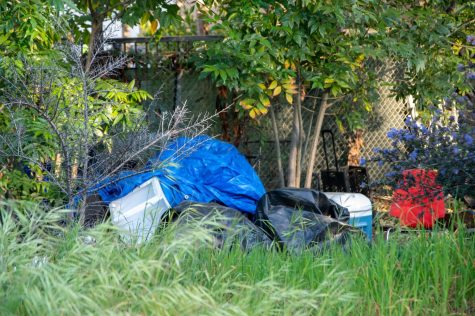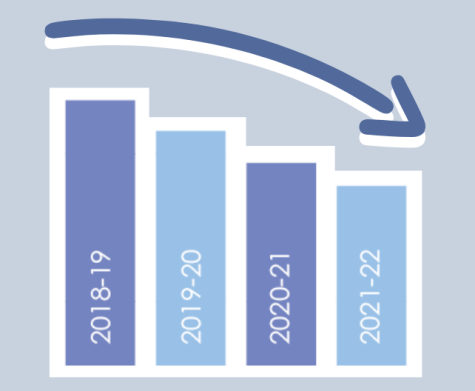Continuous coverage on Ethnic Studies
Following the implementation of the state mandated Ethnic Studies course at FUHSD
Continuous Coverage on Ethnic Studies, updates on the development of the ethnic studies course at FUHSD will be added as new information is available.
March 29
Social Studies Curriculum lead Viviana Torres has been assigned with a three year role that involves facilitating two teams that are part of the development of the Ethnic Studies course at FUHSD: a curriculum development team and a curriculum advisory team.
The curriculum development team will be composed of teachers from a variety of subjects and schools and follows in the footsteps of the former Ethnic Studies Learning Collaborative. The Ethnic Studies course at FUHSD will be flexible to allow different sites to teach curriculum that reflects the demographics of their school. Torres says the aim of the team is to answer questions surrounding the potential course.
“[The curriculum development team will work] to build some of the definitions that our district will use,” Torres said. “What is Ethnic Studies at FUHSD? What are the frameworks, theories and philosophies that we’re going to use as the foundation of that work? What is the vision and what are the non-negotiables that we’re going to use to determine what makes a good Ethnic Studies curriculum?”
On the other hand, the curriculum advisory team will work to get input from students, parents and staff and provide feedback on the curriculum developed by the curriculum development team. Next year, Torres plans to select and build the two teams, have them collaborate and then ask some teachers to pilot the curriculum before rolling it out to all five sites over three years. Torres is working under the assumption that the course will be offered to freshmen as a semester elective and placed in the Social Studies department, but states that no decision has been finalized.
“I really want to emphasize that our goal is to provide opportunities to gain feedback from all different people,” Torres said. “Also, part of the curriculum development team and the curriculum advisory team is that we specifically want to make sure that we’re not just asking [the] parents, teachers, students, administrators, who already have lots of experiences or have a lot of knowledge on Ethnic Studies. We really want to make sure that people understand that despite whatever misunderstandings there might be, we are trying to put together a process that will allow for questions and multiple voices to be heard as we create these new things and anything can change.”
January 23
As the Ethnic Studies course is being further developed and preparations for course design, led by Social Studies Curriculum lead Viviana Torres, have begun, FUHSD is debating two critical decisions, one around grade level and the other around course length.
The first is whether the course will be semester-long or year-long. Social Studies Department Lead Bonnie Belshe believes the course should be a year-long course rather than an “artificially truncated” semester-long course to fully explore the broad subject of Ethnic Studies.
If Ethnic Studies becomes a semester-long course, there is potential to pair it with a new semester-long Health course, which would meet the state health requirements. These requirements were put into place after adopting the California Healthy Youth Act in 2016, which “requires school districts to ensure that all students in grades seven through 12, inclusive, receive comprehensive sexual health education and HIV prevention education.”
“Right now, the health requirements are being split up between the P.E. classes and Biology,” Belshe said. “The sex-ed requirement [in freshman Biology] comes from a health course requirement. [One question being asked is,] ‘If we have Ethnic Studies as a semester, would the district then add health as a semester as well?’”
The second major debate pertains to grade level. Ethnic Studies has the potential to be taught during freshman or senior year. Belshe believes the course should be taught during senior year because students come into it having learned about U.S. History in junior year.
“Looking at the potential curriculum that the state has put out, as well as other schools that already have [Ethnic Studies], there is so much of it that requires a U.S. history background and understanding,” Belshe said. “And rather than having to add all of those [U.S. history] pieces in, which then take away from the time that we can truly use for Ethnic Studies if we have it as a senior year course, then students have a U.S. History background and we can focus more on in-depth, sociological work.”
November 22
Following three meetings hosted by FUHSD’s Ethnic Studies Learning Collaborative, El Estoque conducted a Q&A with Associate Superintendent Tom Avvakumovits, who oversees the development of the course and serves as a support for its teachers. His responses about the Ethnic Studies course are summarized below.
Q: When did the discussions around an Ethnic Studies course start?
A: A couple years ago. Avvakumovits and Coordinator of Curriculum & Teacher Leadership Welton Kwong engaged in conversations that explored the course’s viability at FUHSD, evaluating the “costs and benefits” and discussing steps to make it happen. In response to this exchange, they developed the Ethnic Studies Learning Collaborative to get a broader understanding of Ethnic Studies.
Q: Who is part of the Ethnic Studies Learning Collaborative?
A: The Ethnic Studies Learning Collaborative is made up of two teachers from each of the five FUHSD schools, a few administrators from the school sites, three administrators from the district office, the curriculum leads in English and social studies and two school board members.
Q: Did FUHSD expect Gov. Newsom to sign the law that requires all public high schools in California to offer an Ethnic Studies course by the 2025-26 school year?
A: The decision was expected because, in 2020, Gov. Newsom tabled a bill on Ethnic Studies due to the lack of a model curriculum. This year, after the state approved a model curriculum, Gov. Newsom passed a bill requiring Ethnic Studies courses in all public high schools.
Q: Which department will house Ethnic Studies?
A: According to the California Commission on teacher credentialing, a teacher needs a social studies teaching credential to teach Ethnic Studies; therefore, “from a credentialing standpoint, the course belongs in the social studies department.”
Q: Will the Ethnic Studies course at FUHSD reflect the demographics of the district?
A: The California model curriculum calls explicitly for “local districts to adjust their own Ethnic Studies curriculum to reflect the population of their students.” Although the model curriculum mentions the study of four ethnic groups (Native Americans, African Americans, Latinx Americans and Asian Americans), FUHSD will spend time incorporating the experiences of ethnic groups “that are either a subcategory of those four major ethnic groups or a different ethnic group altogether.”
Q: Will the district work with nearby school districts with similar demographics to develop the course?
A: While the course will be developed by and for FUHSD, the district has reached out to nearby school districts that already have an ethnic studies course to “draw upon their expertise.” Examples include the San Mateo Union High School District, which already has an Ethnic Studies requirement, and the Los Gatos-Saratoga School District, where an Ethnic Studies course is being piloted this school year.
Q: How will FUHSD develop course material?
A: In the following months, the district will create a design team, led by Social Studies Curriculum lead Viviana Torres. The team will design and pilot units in existing courses to “get student feedback, learn from it, make modifications and move forward from there.”
Q: What are the plans for the upcoming meetings with Ethnic Studies Learning Collaborative?
A: The Ethnic Studies Learning Collaborative will spend time resolving “unfinished business about some of the various options around Ethnic Studies,” such as which grade level the course belongs in and the decision on whether the course will be semester-long or year-long. Discussions around these decisions will be made to “allow for voices to both listen and be heard” and develop an informed decision.
October 25
On Oct. 8, CA Gov. Gavin Newsom signed a new law that will require high school students to complete an Ethnic Studies course to meet graduation requirements, starting in the 2029-30 school year. The law also requires public high schools to offer an Ethnic Studies course by the 2025-26 school year.
Social Studies Department Lead Bonnie Belshe and English teacher Sara Borelli are part of the MVHS Equity Task Force and have joined the team that is working on the development of an Ethnic Studies course for FUHSD.
“We’ve been talking about it informally for quite a few years now,” Belshe said. “But this year is when we really started to have more weight to the conversation and got together a working group that has had two meetings [so far].”
According to Belshe, the course is interdisciplinary and is “particularly focused on groups and people who traditionally have been outside the traditional narrative of white American history.”
The development of the course will take time, and FUHSD has not yet finalized decisions on the course, such as the grade levels it will be offered to, in which department and when.
“It’s a very slow process right now,” Borelli said. “We’re doing a lot of discussion on what Ethnic Studies [is and what it] isn’t, what it would look like, where would be placed [and] how it would work in our district.”
Updates on the development of the Ethnic Studies course at FUHSD will be added as new information is available. More information on the Ethnic Studies course can be found in the bill and the CA Department of Education’s model curriculum.






